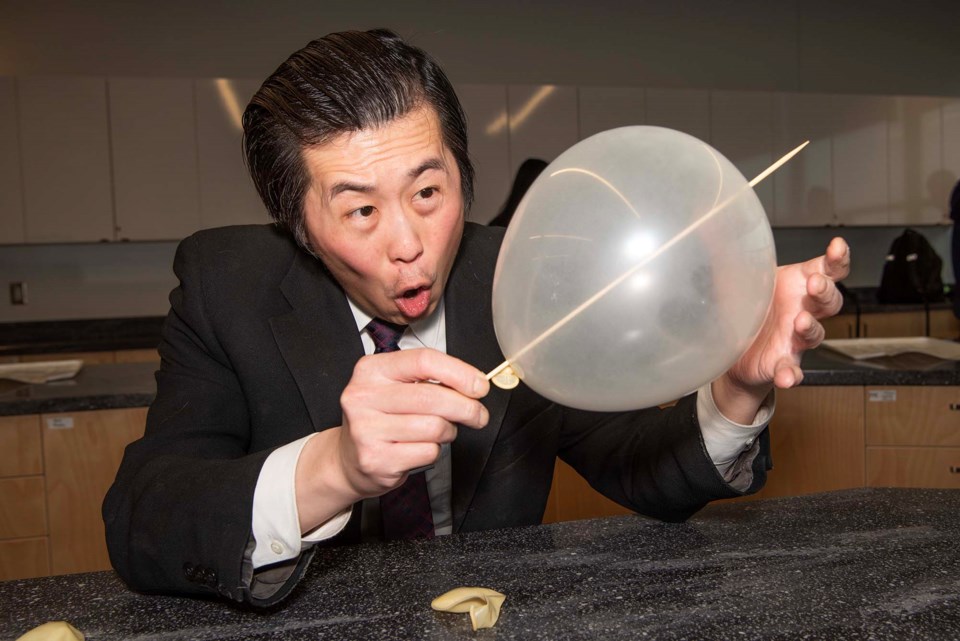St. Albert and Sturgeon County teachers will hit the books this week to learn new skills at their annual teachers convention.
Some 6,300 teachers will be in Edmonton this Feb. 8 and 9 for the 2024 North Central Teachers’ Convention Association (NCTCA) convention. Their students have those days off.
Provincial law requires all Alberta teachers to dedicate at least two days each year for professional development, said NCTCA president Carryl Bennett. Those days happen at nine regional teachers’ conventions, of which the NCTCA’s is the first in any calendar year. The NCTCA convention is open to any teacher who works in a community around, but not in, Edmonton.
“We’re kind of the doughnut or onion of Edmonton,” Bennett said, referring to the event’s attendance area.
This year’s conference includes sessions on math, drama, religion, Dungeons & Dragons, truth and reconciliation, and more.
Timely topics
In addition to his usual demonstrations of how teachers can use science-based magic tricks to enhance education, Paul Kane chemistry teacher Michael Ng is also doing a talk on the effects of inquiry-based learning on engaged learners.
Ng said he did an experiment last year as part of his graduate studies to see how worksheet design can improve student engagement with lessons. He gave his students two worksheets — one with the standard “solve this equation” questions you’d find on a test, and one with problems based on real-life scenarios such as “help the Apollo 13 astronauts avoid suffocation” — and surveyed the students to see which one they preferred. The survey showed the students preferred the worksheet based on real-life scenarios.
“Students always question, ‘Why are we learning this?’” Ng said, but if you can connect lessons and exercises to real-life or career-related scenarios, you can make them relevant and interesting to students.
St. Albert Catholic High alumnus and Jasper Place High Physics teacher Ian Doktor will host sessions on astronomy, electric cars as teaching tools, and artificial intelligence in the classroom.
“AIs are sort of like a very good personal assistant you can’t trust,” Doktor said, quoting Canadian scientist Dan Riskin. You can use them for many tasks, but you must check everything they do for accuracy.
Doktor said he uses AI services such as ChatGPT almost daily to create activities and lesson plans but must heavily customize what comes out of them to make them usable. He also uses AI-powered websites to try and detect AI-written student assignments. One of his colleagues has explored using AI to create writing prompts for his classes. AI has also made evaluating students more difficult, with many teachers switching to more in-class assessments to make sure their students aren’t using AI to do all their work.
Many of the problems of AI in the classroom won’t be resolved until society determines how much AI-generated content it wants to accept, Doktor said.
“We can’t simply say, ‘This is not something we want to deal with,’” he said.
“Whether we like it or not, this is going to be a new norm in society.”
W.D. Cuts principal Cory Albrecht is co-hosting a session on how to create supportive spaces in schools for two-spirit, lesbian, gay, bisexual, transgender, queer, and other (2SLGBTQ+) students.
2SLGBTQ+ students are some of the most marginalized groups in schools and have higher rates of anxiety, depression, and suicide than others, Albrecht said. His school uses guest speakers, gay-straight alliances, health lessons on trans issues, prominent visual shows of support such as rainbow flags, and other measures to create an environment where such students feel safe and welcome.
“We try and promote this acceptance for everyone that’s in our building,” he said.
Albrecht said it is important to teach students about gender and sexual minority issues so they can better understand the people around them.
“It’s the right thing to do for the kids, it is research-based, and it’s covered in legislation at all levels.”
Visit mynctca.com for more on this year’s convention.




